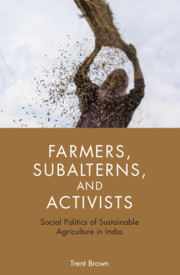Book contents
- Frontmatter
- Dedication
- Contents
- List of Images
- Acknowledgements
- 1 Introduction
- 2 India's Agrarian Crisis: A Gramscian View
- 3 Embedded in Power: Potentials and Constraints of Sustainable Agriculture
- 4 The Kheti Virasat Mission: People's Movement or Agrarian Populism?
- 5 The Tamil Nadu Organic Farmers’ Movement: The Limits of Participatory Approaches
- 6 The Beej Bachao Andolan: How ‘Grassroots’ is the Grassroots?
- 7 Conclusion
- Bibliography
- Index
6 - The Beej Bachao Andolan: How ‘Grassroots’ is the Grassroots?
Published online by Cambridge University Press: 08 July 2018
- Frontmatter
- Dedication
- Contents
- List of Images
- Acknowledgements
- 1 Introduction
- 2 India's Agrarian Crisis: A Gramscian View
- 3 Embedded in Power: Potentials and Constraints of Sustainable Agriculture
- 4 The Kheti Virasat Mission: People's Movement or Agrarian Populism?
- 5 The Tamil Nadu Organic Farmers’ Movement: The Limits of Participatory Approaches
- 6 The Beej Bachao Andolan: How ‘Grassroots’ is the Grassroots?
- 7 Conclusion
- Bibliography
- Index
Summary
I was sitting in a sweet shop in the market town of Khadi in early 2014, eating jalebi, sipping on a smoky, over-sweetened cup of tea. I was on my way to visit the village of Rampur, just outside of the Henwal Valley, which had been my base in 2010 while I conducted my research on the Beej Bachao Andolan (Save Seeds Movement, hereafter BBA). I was returning to the village to spend some time with the family with whom I had stayed and to see how things had progressed for the movement.
Khadi was the closest town to the main road. From there, one had to board a ‘shared taxi’—a ten-seater jeep that would be filled with as many as eighteen people (and often a few more on the roof). The taxi would meander up dirt roads to the villages further up the hills. My friend and translator Deepak had been told that it would take a while for the jeep to fill and that we should just relax for some time.
As I sat in the sweet shop, Deepak ushered in a familiar face from outside. It was Dhoom Singh Negi, who I had interviewed for my research on BBA during my previous visit. I was very pleased to see him. Dhoom Singh has a gentle manner and warmth of presence that immediately sets one at ease. He was a prominent activist within BBA but perhaps more well-known for his work as a major organiser of the Chipko movement of the 1970s and the anti-Tehri dam movement of the 1980s and 1990s. He is known locally for his work as a Gandhian social worker and widely respected as an honest and humble man who has sincerely put Gandhi's philosophies of simple living and locally-oriented social work into practice.
Deepak reminded Dhoom Singh of who I was. We exchanged pleasantries and he asked me about my work. I told him that I had recently had an article published about my research on BBA (Brown, 2014). I told him what I had written: that BBA had, in many ways, kept the Gandhian and ecological ethic of the Chipko movement alive in the Henwal Valley—but that this ethic did not seem to resonate with the younger generation, many of whom were leaving their villages due to a severe shortage of employment opportunities.
- Type
- Chapter
- Information
- Farmers, Subalterns, and ActivistsSocial Politics of Sustainable Agriculture in India, pp. 139 - 166Publisher: Cambridge University PressPrint publication year: 2018



